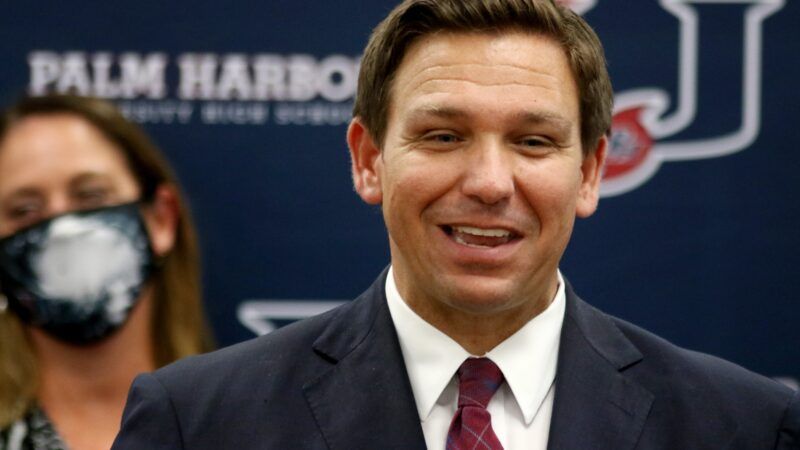Why Hasn't the Mainstream Media Pilloried 60 Minutes for Spreading Misinformation?
So far it's crickets from The New York Times and The Washington Post.

Earlier this week, 60 Minutes dropped a bombshell: Florida Gov. Ron DeSantis, a Republican, had granted Publix a vaccination contract as a kickback for a $100,000 campaign donation, according to a report by journalist Sharyn Alfonsi.
Then the story swiftly fell apart. Publix was neither the first nor the only vaccine distributor in Florida; the idea to use a grocery chain with more than 800 locations across the state was a good one, and did not originate with the governor; moreover, DeSantis explained all of this to Alfonsi, but his quotes were edited in a misleading way for the version that appeared in the 60 Minutes segment.
Bafflingly, CBS News is standing by this atrocious hit job. "For over 50 years, the facts reported by 60 Minutes have often stirred debate and prompted strong reactions," said the network in a statement released Tuesday. "Our story Sunday night speaks for itself."
This story should be a source of deep embarrassment for the network: Alfonsi made incendiary claims that she utterly failed to prove, and the report actively concealed from viewers the more plausible explanation offered by countless government leaders involved in the decision, including DeSantis himself. (Florida's director of emergency management, as well as the mayor of Palm Beach County—both of them Democrats—have subsequently released statements blasting CBS's distortions.)
It should have also drawn a thorough debunking, as well as outright condemnation, from other corners of the mainstream media. An accusation of corruption leveled by a major television network against a likely 2024 contender is a big story. It's perhaps an even bigger story when it turns out the network got it completely wrong. Media critics at The New York Times, The Washington Post, and elsewhere should be all over this.
The Times has published 10 articles that reference DeSantis in the last week, but not a single one of them concerns the 60 Minutes story. The Post linked to the story in its Monday email but has had nothing to say about its collapse.
Axios, on the other hand, published an article about the "clash" between DeSantis and 60 Minutes that was overly favorable to the latter. Axios made it sound like it was still an open question whether the Publix contract was a kickback and did not go into detail about the unfair editing of DeSantis' explanation.
Astonishingly, Axios then published a second, significantly worse article that accused DeSantis of milking his "spat" with 60 Minutes. "Florida Gov. Ron DeSantis, a Trump ally with his eyes on the White House, is dialing up a dispute with 60 Minutes—seizing on a juicy chance to ingratiate himself with the GOP base by bashing the media," wrote Axios, as if the media-bashing was not well-deserved in this case.
Again, anyone alleging that there's something unethical here has a high bar to clear. In order to beat COVID-19, it's imperative to vaccinate as many people as quickly as possible nationwide: This obviously entails partnerships between governments and giant distributors in both the public sector and the private sector, many of which will have donated to various elected officials given the reality of the world we live in. As The Intercept's Lee Fang pointed out, California Gov. Gavin Newsom, a Democrat, received millions in campaign donations from Blue Shield of California—vs. DeSantis' paltry $100,00 from Publix—and then put the healthcare provider in charge of vaccinating the state, but no 60 Minutes story has described this arrangement as unethical.
Journalism industry watchdogs should be all over CBS for this. But there's nothing about 60 Minutes over at Columbia Journalism Review. The dial on PolitiFact's Truth-O-Meter hasn't budged.*
One praiseworthy exception is CNN. Journalist Oliver Darcy highlighted the controversy regarding the article in his own reporting, and correctly noted that CBS "never offered any substantive evidence to support the significant assertion and link the donation with the partnership."
But Darcy aside, it has largely fallen to conservative media—Fox News, The Daily Caller, The Federalist, The Daily Wire, Townhall, and others—to cover this debacle. The mainstream media's silence makes it seem like the matter is some contentious, undecided political issue, with liberal journalists claiming one thing and a leading Republican politician saying another. But that's just not the case. CBS made an extraordinary, unsubstantiated claim, offered no proof, and ignored adequate answers from government officials in both parties.
And some in the media still wonder why Republicans and independents are so distrustful of them.
*Update: The Poynter Institute, which operates PolitiFact, has now published a satisfactory article about the 60 Minutes story.


Show Comments (260)